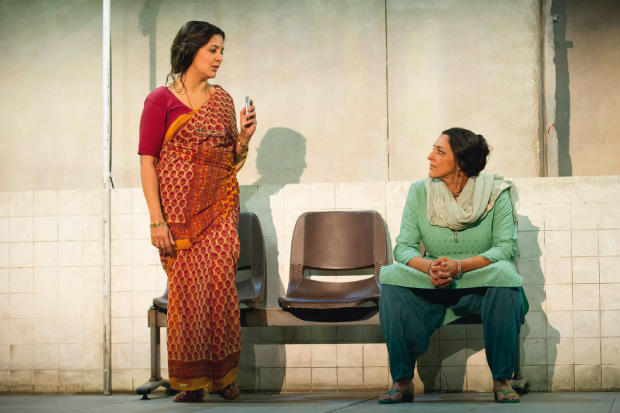It’s taken a while but here it is. The Play That Goes Wrong is like Noises Off, but simpler. Michael Frayn’s cumbersome backstage farce asked us to follow the actors’ personal stories as well as their on-stage foul-ups, and the surfeit of detail proved a bit of a brain-scrambler. This is a badly rehearsed thriller played by useless amateurs on a disintegrating set. Good clean knockabout.
Some of the background information is puzzling. The troupe calls itself the Cornley Polytechnic Drama Society even though polytechnics no longer exist. And their decision to put on a creaky 1920s murder mystery seems a little perverse. Aside from the booby-trapped props and collapsing furniture, they haven’t a clue how to bodge their way out of difficulties. This slightly mars the comic effect. A corpse has to be stretchered off and when the stretcher breaks, the actors abandon the corpse and remove the stretcher. Real actors would abandon the stretcher and remove the corpse. When a jammed door traps a player off-stage he delivers his lines as if he were on-stage. But why?
The show, written by two of the cast, suffers very slightly from the vice it sets out to mock: staginess. To impersonate a really bad actor takes a really good actor, and a few of these aren’t up to it. One stands out. Dave Hearn plays a chinless toff in the first half and a dim gardener in the second, and he brilliantly conveys the awkward and narcissistic self-consciousness of an amateur thesp who can barely contain his glee at having reached the West End.
At a guess, I’d say this show will do very nicely at the box office but my verdict is irrelevant because farces of this kind, like musicals, tend to be impervious to critical analysis. What counts is word of mouth. I kept a close eye on my fellow play-goers at the Saturday matinee. For the first 20 minutes they smiled indulgently. Then they started to cough because the show seemed to be shaping up as an elongated Victoria Wood sketch. Coughing is a very bad sign. But then the comedy began to escalate, and its ingenuity and complexity intensified, and the laughter started to build and spread. By the end, the house was roaring its collective head off. Two hours of slapstick may not suit every taste but here’s a thought. If you have teenage boys who loathe the very idea of theatre, send them to this. The second act contains passages of outrageous comic violence that every juvenile delinquent will cherish. And if this show does prove a triumph, the producers will start casting about for another script along similar lines. There are plenty more awaiting the green light.
Calamity strikes at the Trafalgar 2. Land of Our Fathers is a mineshaft melodrama set in south Wales in 1979. Mrs Thatcher has entered Downing Street and an explosion in a water tunnel has trapped six colliers half a mile underground. Will they survive or not? The script begins as a quirky comedy with lots of offbeat dialogue. The writer, Chris Urch, has a knack for an eccentric gag but he overuses Alan Bennett’s trick of forcing laughs by getting senior characters to swear.
Then the story turns melodramatic. Long-suppressed secrets emerge between the older and younger miners. There’s lots of shouting. Then it all becomes whimsical. To pass the time, they play parlour games. They sing, too, being Welsh. Not just any old ditty either. They belt out an a capella version of ‘Pretty Vacant’ by the Sex Pistols with harmonisations thrown in. Well, you would, wouldn’t you?
Then it gets macabre. One chap suggests they survive by eating a colleague who happens to be dead. For the next quarter of an hour everyone screams at each other. Result? Miner is off the menu but the characters are exactly where they were before the shouting started. Actors yelling dialogue may feel dramatic but it isn’t necessarily. It may just be rehearsed noise.
This isn’t a bad first play but it shows signs of immaturity. Most glaring is the absence of Mrs Thatcher as a motif. The writer hoists it high in the opening scene but barely gives it a second glance thereafter. It’s obvious why. As the drama took shape in his mind it seemed a promising theme but it sank into irrelevance as soon as he started writing. A generous critic might hail the result as a masterstroke of retrospective symbolism: Mrs Thatcher is redundant and the miners aren’t. Unfortunately there aren’t too many generous critics.







Comments